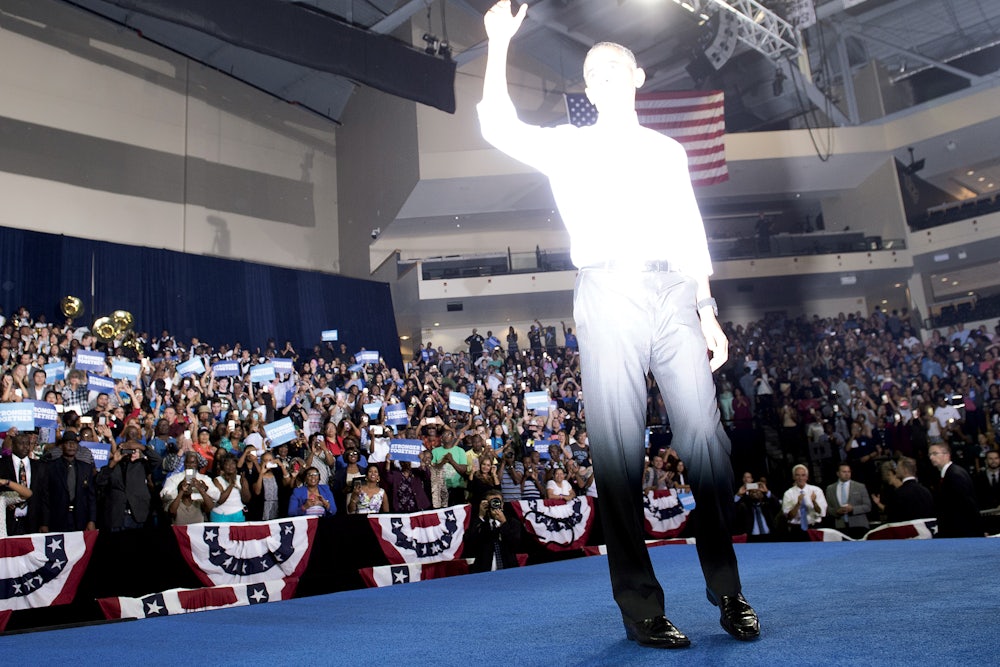From the moment Barack Obama was elected in 2008, he began to disappoint those who had believed in his message of change. He appointed entrenched Washington insiders to his Cabinet. He put Wall Street bankers in charge of regulating Wall Street banks. He compromised with Republicans on the economic stimulus, slowing the recovery for millions of Americans. He refused to push for universal health care, and deported two million immigrants. He failed to shut down Guantanamo, dispatched another 60,000 troops to Afghanistan, and launched hundreds of drone strikes that killed countless civilians. Today, income inequality continues to rise, and big banks are bigger than ever, and student debt has hit a record $1 trillion. Democrats have not only lost control of every branch of the federal government, they are weaker at the state level than at any point since 1920. Those who thought they had elected a bold and inspiring populist were surprised to find him replaced by a cautious and deliberate pragmatist.
Now, eight years later, many of Obama’s critics suddenly find themselves yearning for the euphoria that accompanied his election, and fearing for the small but significant progress he made on a host of fronts: equal pay, expanded health care, nuclear nonproliferation, global warming. It’s not just that hope and change have given way to fear and loathing—it’s that so few of us saw it coming. Right-wing extremists, it turns out, aren’t the only ones who live in a faith-based reality of their own making. From Brooklyn to Berkeley, American liberals have cocooned themselves in a soothing feedback loop woven from Huffington Post headlines, New York Times polls, and repeat viewings of Madam Secretary. If nothing else, Trump’s election demands that we return to the real world in all its complexities and contradictions, and confront our own obliviousness.
Taking the Long View
The Participants In Our Forum On Obama’s LegacyWe can begin by reassessing the president we still have, while we still have him. Barack Obama came to office with an ambitious liberal agenda. He sought to make America great by emphasizing unity over division, civic responsibility over corporate greed, international engagement over foreign intervention. Eight years later, what lessons can we learn from his successes and failures? And how much of his legacy will survive the coming onslaught?
Two days after the election, we sat down with five leading historians and political observers in the New Republic’s offices in New York City, overlooking Union Square. At the table were Annette Gordon-Reed of Harvard and Nell Painter of Princeton, two of America’s preeminent scholars on American history. They were joined by Sarah Jaffe, John B. Judis, and Andrew Sullivan, journalists and authors who have explored the wider forces that have shaped Obama’s presidency. The streets below were packed with thousands of anti-Trump protesters, and their rising chants served as a grim counterpoint to our conversation about Obama, and where he leaves us.
I. Is Trump Obama’s Legacy?
Let’s start with the seismic political reversal that just took place. It’s hard to imagine a bigger shift for America than going from Barack Obama to Donald Trump. The two of them are polar opposites in almost every regard. But now, instead of seeing his legacy cemented, Obama faces the prospect of having his major accomplishments undone. How much responsibility do you think that he himself bears for creating the conditions that allowed Trump to get elected? In retrospect, are there things he could or should have done to protect and institutionalize his agenda more?
NELL PAINTER: I don’t think it has anything to do with him personally, except that he’s a black man. The election of Trump was a gut-level response to what many Americans interpreted as an insult eight years ago, and have been seething against ever since. The only way you can see Trump as somehow Obama’s fault is Obama’s very being. It’s ontological.
ANNETTE GORDON-REED: I agree with Nell. There’s nothing he could’ve done in this climate other than be somebody else. We know the record of obstruction by Republicans, the lack of cooperation. Some Democrats suggested that Obama was giving things away before they were even asked for, to try and be accommodating. But there was no chance for bipartisanship—it was obstruction from day one.
PAINTER: Before day one.
GORDON-REED: Before he had done anything: “We’re going to make him a one-term president.” People suggested that he didn’t try to work with Congress enough. They’d ask me about Jefferson and his dinner parties: “Obama didn’t invite people over for dinner like Jefferson did!” But today is a different time, and Obama is a different person. You can always do things better. But nothing he could have done accounts for what’s happened.
SARAH JAFFE: I can’t separate Obama from the financial crisis he inherited. What could he have done if the economy didn’t explode? Maybe he could’ve had a magically perfect health care program, or maybe he could’ve used the crisis to nationalize all the banks. But in reality, probably not. So it’s really difficult to say what he could have done versus what we’d like him to have done.
JOHN B. JUDIS: There were a number of things he didn’t do that could have prevented Democrats from losing their majority in 2010. In his first two years, Obama didn’t really understand the connection between policy and politics. He would say that himself now.
PAINTER: That’s right.
JUDIS: He didn’t go after the banks and Wall Street the way Roosevelt did in 1933. That left a political vacuum that made it possible for the Tea Party to become the major mass political force in the country by August of his first year. And he was naïve about the possibility for bipartisanship, especially in the way that he dealt with the Affordable Care Act. Obamacare ended up being designed in a way that allowed the middle class and senior citizens to think that they weren’t getting much out of it, and that their tax dollars were going to subsidize the uninsured. So there was a failure in those first two years that led to the gridlock and other problems that made it easier for Trump to come in as the champion, as the man on the white horse who’s going to change all that.
That said, we also have to recognize something else: There’s a third-term curse. The party that controls the White House for two terms always has a hard time keeping it for a third term. Think of Kennedy beating Nixon in 1960. That wasn’t because Eisenhower was unpopular—it’s because Kennedy was going to get the country moving again.
Whoever is trying to succeed the incumbent can’t really position him or herself as the agent of change, because then you’re repudiating your own president: Nixon would be repudiating Eisenhower, Gore would be repudiating Clinton, Hillary would be repudiating Obama. So they have this incredible dilemma that doesn’t allow them to represent themselves as having a vision for how to change the country. The only time I can remember that it didn’t happen was with George H. W. Bush, but that’s because the Democrats nominated Michael Dukakis, who was hapless as a candidate and had no vision of change. Trump was not a hapless stiff—he was a very effective candidate.
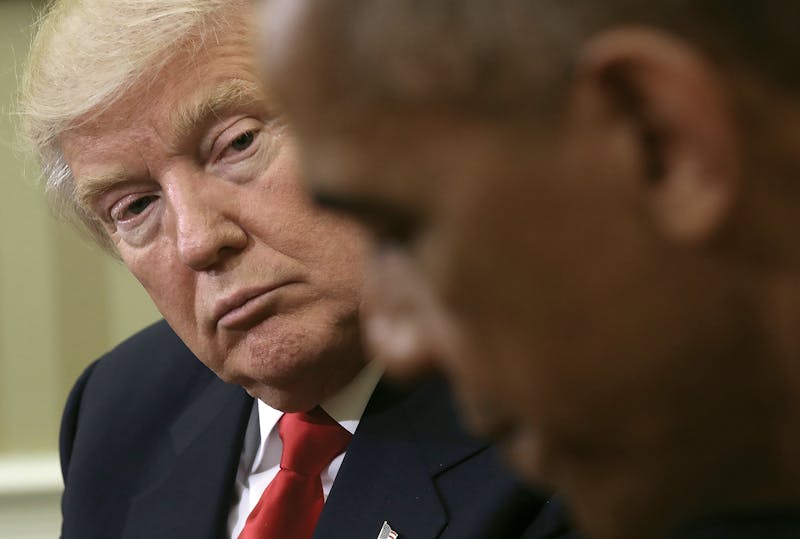
Andrew, did Obama help create the conditions for Trump’s victory?
ANDREW SULLIVAN: If Obama had run for a third term, he would have won. It’s Hillary Clinton’s fault. The worst candidate for president in recent history. Worse than Dukakis. She threw this away. Insofar as that’s Obama’s responsibility, it was in not making sure that Biden entered the race, and being cowed by the Clintons, and not finding a successor who could win the coalition he had assembled. The Clintons destroyed Obama. No one else. Even so, she won the popular vote. But because she’s just a dreadful candidate, and someone almost no one can imagine being president of the United States, she—
GORDON-REED: Oh, I could!
SULLIVAN: She’s a terribly unpopular person. Horrible: no inspiration, no political skills, complete mediocrity. So that’s the mistake—allowing the Clintons to keep control of the party and then allowing this mediocrity to be his successor.
PAINTER: [Gesturing to the other women around the table] Can we just say: We entirely disagree with that.
JAFFE: Well, I don’t know. I think Hillary Clinton was a lousy candidate.
GORDON-REED: I don’t think she was a lousy candidate. But for a candidate to lose to someone who’s never been in the military, who’s never held public office—he’s not like any candidate who’s ever run before. So there were other forces at play here, most notably her gender.
PAINTER: She’s an older woman.
GORDON-REED. That’s right. It’s clear that many people have a hard time paying attention to older women as anything other than mothers or grandmothers.
SULLIVAN: She’s just a bad candidate and a terrible politician whom large numbers of people despised. You can see it in the polls: She represented everything that people hate about Washington.
PAINTER: Yeah, because she’s an older woman.
SULLIVAN: The idea that she should have been the candidate to replace this inspiring new person who really did transform America was itself a joke. So was the Democratic Party’s delusion in thinking that being the spouse of a former president would be an advantage in this election, when obviously it wasn’t. She couldn’t even win white women against someone who has a history of sexual assault.
GORDON-REED: Well, that says something about white women. We’re talking about this like it was a landslide against her. I mean, Dukakis—what did he win?
JAFFE: Exactly. That’s why I think Elizabeth Warren could have won.
GORDON-REED: You think Elizabeth Warren could’ve won?
JAFFE: Yes. She could have run on a more populist message, and she would have been better at it. Plus, her name does not say “NAFTA” in Indiana and Wisconsin and Ohio.
PAINTER: But it would say “socialist.”
GORDON-REED: And it would say “Pocahontas.” I mean, she was my colleague at Harvard, and I love and would support Elizabeth. But Trump understands media, he understands narrative, he understands story. This has been a story. And he played it very, very well. He would have done it against anybody.
II. Obama’s Machine
Obama entered office with one of the most effective political machines in history. But instead of using it to create grassroots support for his agenda, he basically shut down the entire operation and told his supporters, “I got this.” In basketball terms, he bet his entire presidency on an inside game. Do you think that was a mistake?
JAFFE: Well, he didn’t shut it down. This narrative kind of annoys me. He mobilized it in the wrong direction. I was reporting on the people in Organizing for America, who came out of Obama’s campaign. And when it came time to pass the Affordable Care Act, the people who were organizing through the OFA were told to pressure Republicans, who were never going to vote for anything. They should have pressured wavering Democrats, like Rep. Bart Stupak from Michigan, who were going to flip the whole thing if they couldn’t have it be anti-abortion. So I cringe when people say he demobilized his operation. He just didn’t mobilize it in a way that would have actually been useful, because he wasn’t willing to deploy it against his own party.
He certainly didn’t mobilize it in the way that the right mobilized the Tea Party—as a grassroots machine. Did he miss an opportunity by not capitalizing on the operation he built and running it in a more active way?
JUDIS: It’s hard for presidents to do that. Reagan didn’t really try to do it. You have to have an outside force that does it. At the time, I was as critical as anyone of their turning it into a kind of subsidiary of the Democratic National Committee. But it’s hard to pull off. One of the things you have to have is a very clear adversary. And one of the things that Obama was unwilling to do in his first year was to declare himself the president of Main Street against Wall Street—to really go after the Republicans. He only figured that out after August 2011, when they really screwed him with the whole national debt crisis and the sequester. If he would have done that from the outset, there would have been more of a possibility of mobilizing. But it was that kind of ambiguity that left the door open.
PAINTER: We’re also forgetting the cultural context of all this: that Obama was operating as a black man among a whole bunch of white guys. They were middle Americans whose gut sense was distrust—not being comfortable with him, not wanting to go along with him. There was a lot of static going on. He had to prove that he wasn’t a communist. That’s part of the reason, I’m guessing, that he didn’t move further left against the banks and kept on the side, really, of the Republican financial establishment.
JAFFE: I agree with John that you need an outside force. But in this case, the outside force voluntarily demobilized: After the stimulus was approved, the labor movement refused to push on the things they wanted. Everybody went along with Obama’s idea that “now we pivot to health care,” even though unemployment was still at 10 percent. Nobody was willing to push him, largely because the left was just coming out of eight years of PTSD over George W. Bush.
SULLIVAN: He won reelection easily. All these arguments about his first term: How did he win reelection so convincingly, if he got things so wrong?
You’re saying that it didn’t matter that he didn’t mobilize grassroots support?
SULLIVAN: If he’d moved left in that first term, he wouldn’t have won reelection.
JAFFE: I think it depends what we’re defining as “left.”
GORDON-REED: He didn’t have to go very far to be too left for some people. For the first black president, there were all kinds of psychic things going on that just don’t apply for a “regular” person. He couldn’t have gone too far left and won.
PAINTER: This is the only place I’m sort of separating myself from John. Because you, John, are thinking of this context without the racial dynamics that played a big part in narrowing his room to maneuver.
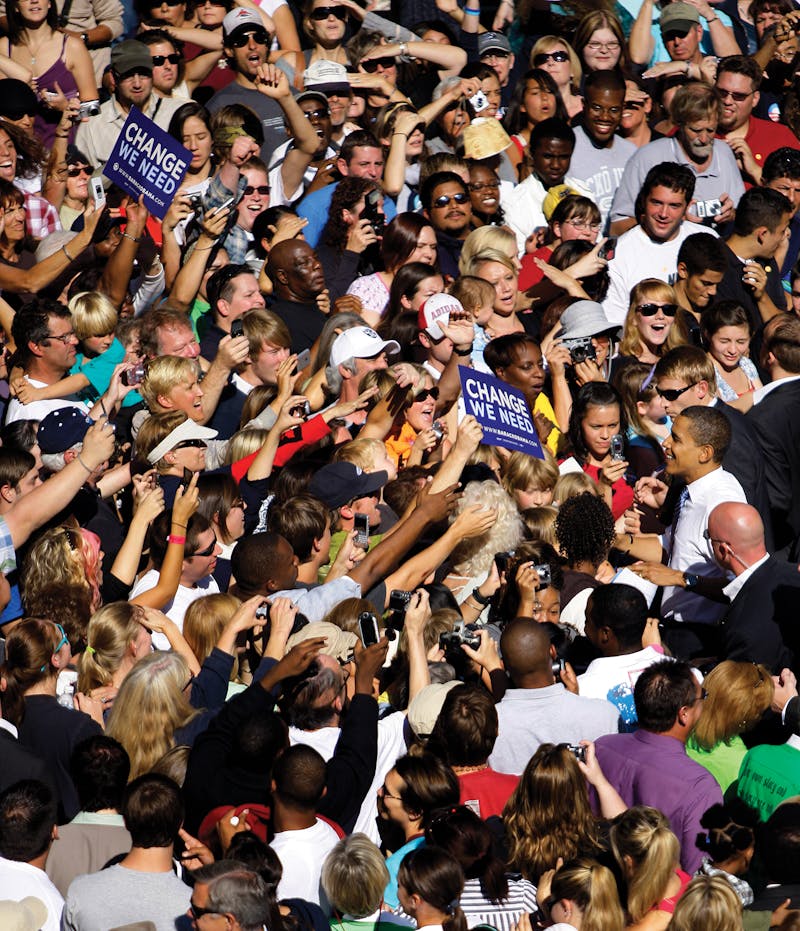
SULLIVAN: He won more white voters in 2012 than Hillary Clinton just did, OK? He was always popular with white people in the Midwest. This whole racial thing is just so myopic.
GORDON-REED: No, it’s not myopic. We’re talking about his responses to things. We’re talking about why an individual maneuvers in a particular way. If you are an African American person and you are in this setting, you can’t maneuver like a white person. Sure, there are white people who like him—that’s not the question. The question is, why did he act in a particular way?
SULLIVAN: What should he have done otherwise and didn’t because he’s black?
It sounds to me like you’re all reaching a similar conclusion from different directions. You all agree that Obama didn’t move left. Andrew’s just saying that he didn’t need to, because he already had the support he needed among white voters.
SULLIVAN: They keep saying that because he’s black he couldn’t move left.
PAINTER: Andrew, that is so gross, in the sense of using such a big club. You’re not hearing what we’re saying in terms of context, psychology, and culture. It’s not a toggle switch of racism, or “because he’s black.” It’s because of the fine-grained nature of our society. What he could accomplish changed month by month, week by week, congressman by congressman, senator by senator. What I’m trying to say is that there’s more going into this than just the policy and the politics.
JUDIS: I agree. At the time, there was always the Jesse Jackson comparison—that if Obama wanted to succeed, he couldn’t sound like Jesse Jackson, he couldn’t raise hell. But I think there were two other factors that played into that. First was the financial crisis: Tim Geithner and Larry Summers argued that they couldn’t do something that would create a crisis of confidence among the banking industry and Wall Street. And second was that based on Obama’s experience as a state legislator in Illinois, he had this idea that he could pull off a bipartisan compromise. Those are really the two big reasons, leaving aside race, why he took a very cautious course of action that first year.
JAFFE: And there was almost no one within his party who was willing to break ranks with him. Nobody was pulling left.
III. His Biggest Success
Let’s broaden out beyond politics and talk about what he achieved as president. I’d like to hear from each of you what you consider to be his single biggest accomplishment that will outlast the Trump era. What will history look back on as his greatest achievement?
JUDIS: What will outlast Trump? We just threw everything out! [Laughter]
Well, that’s really the question now: What did he do that’s going to survive?
JAFFE: That’s such a hard question. After Trump, I think we’re going to look back at Obama and be like, “Oh, this was such a decent human being in the White House.”
GORDON-REED: And no scandals.
JAFFE: Right! Even the people who are the angriest at Obama post pictures of him and his family on Facebook and go: “Look at how great they are.”
GORDON-REED: Well, maybe not the angriest.
JAFFE: OK, true. But if Hillary Clinton was going to be president in January, I would have come in here and been really critical of the Affordable Care Act. In a few months, though, I’m going to have no health insurance instead of crappy health insurance. It all looks very different now. I don’t know what’s going to last.
PAINTER: I agree with you that it’s going to be mostly nostalgia, because the Republicans want to dismantle everything that Obama did. As you say, what we will remember is an upstanding family, a clean-living family, a rather liberal administration, as well as ethical and honest. It will look like the good old days.
GORDON-REED: Also the fact that he got elected. It was a particular moment.
PAINTER: And reelected! We can feel good about ourselves.
GORDON-REED: We can feel very good about it. America crossed a particular marker there. I think that will be important. Along with his intelligence, his spirit.
Andrew, this is something that you’ve written about. You have called Obama a “living, walking example of American exceptionalism”—just the fact of his election, and the way he’s conducted himself. Do you see that as the thing that will most endure? Or do you see other things he’s accomplished that will be a significant part of his legacy?
SULLIVAN: Look, we just elected someone, and we have no idea what this person is going to do in office. He has supreme total personal power for the indefinite future. He’s destroyed the Republican Party and created what looks like a neofascist party in its place. But I would put a bet that a lot may last that people are currently dismissing. Let’s just take three examples:
First, of all the things Obama achieved, saving the global economy from a second Great Depression is a huge achievement that will outlast Trump. Second, redirecting American foreign policy away from neoconservative, global interventionism will actually be entrenched by Trump. That is one of the key reasons he was elected in the first place, and that huge shift in global power is something that will last. And third, Obamacare. Republicans are saying they’re going to repeal it. Well there are 13 million people, including me, on Obamacare. I’m extremely happy with my Obamacare.
JAFFE: [Laughs] I’m not.
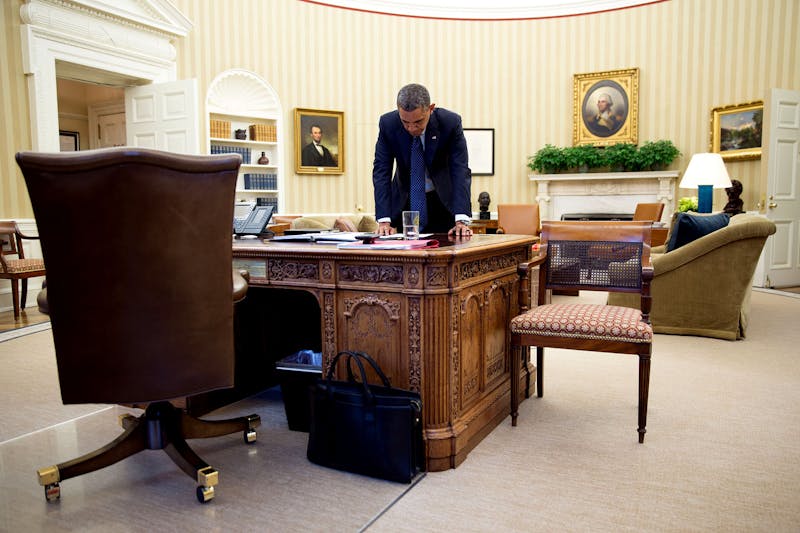
SULLIVAN: The question is: Can they throw 13 million people off health care and face no massive political problem? The thing that’s happened is that the dog has caught the car. They now have to do what they said they were going to do, and the consequences of doing that would be quite extraordinary.
So those are three rather huge things that could well outlast Trump. Sure, there are things Trump can throw out. He can eliminate every single action on climate change that Obama was able to do through the executive branch. But that doesn’t mean that Trump can abolish the fact that climate change is happening. At some point, reality will intrude.
JAFFE: When Washington, D.C. is under water.
SULLIVAN: And there are other things that could survive Trump. Let’s look at the Iran deal on nuclear nonproliferation. Will Trump really rip it up and launch a new war in the Middle East? Will his buddy Putin, who signed the deal, be happy with that? I don’t think that the revolution in civil rights for gay people can be easily reversed. I think the social shift we saw toward legal marijuana and the unwinding of the drug war is something that may well endure. And I think Obama as an emblem of the future of America may well reemerge. He once said to me, personally, in an offhand moment, “You know, I wonder if I became president 20 years too soon.” And in 20 years’ time, we may see the Obama administration as the architecture for the entire twenty-first century. So let’s just pause on the notion that it’s all completely over. It’s been wrecked by the money-grubbing, power-hungry Clinton machine, and the one great silver lining of this tragedy is that those awful people may leave the stage.
GORDON-REED: And it’s been wrecked by the white nationalism that’s always been there, and now feels that it has power. The kind of people I knew growing up are not going anywhere. Maybe in 20 years, Obama might be regarded like you suggest, Andrew. But between now and then, we might be in for a pretty rough time. It’s not going to be all pretty after this.
John, same question: What do you think Obama has achieved that will outlast Trump?
JUDIS: It’s possible that there might be a way to preserve Obamacare so that it’s actually improved. That’s what happened in Australia after Conservatives repealed national health care—Labor came back and made it better, and now no one will touch it. That would be an amazing achievement for Obama. Getting through the Great Recession, especially the auto bailout, was important. In his second term, the Iran deal.
JAFFE: Sitting here and listening to the chants of the Trump protesters in Union Square, I’m reminded that thousands and thousands of young people got trained as organizers in Obama’s campaign. Then they went out and raised hell and didn’t wait for Obama to do it for them. The young people in Ferguson, the young people in New York, the young people in Chicago and everywhere else are saying, “OK, real change is not going to come from the president. It’s going to come from us.” That, in the long run, may be one of the most enduring aspects of Obama’s legacy.
IV. His Biggest Failure
Let’s take the same question in reverse: What do each of you see as Obama’s biggest failure?
PAINTER: Overestimating the ability to work across the aisle. Coming in and thinking that he could work with Republicans. Paul Krugman and Hillary Clinton told him in 2009 that this sunny idea of bipartisanship was unrealistic. I myself wanted him to be tougher and not take so many steps toward the Republicans and really to fight it out much more.
GORDON-REED: I was not overly thrilled with Guantanamo. I understand I don’t have all the information, but many of those people were not the worst of the worst. As a lawyer, I’m concerned about what it does to the rule of law to have people held without trial for this length of time. That’s problematic to me, the way he handled that. He continued Bush’s foreign policy in ways that I think—
PAINTER: The military aspect?
GORDON-REED: Mainly with Guantanamo and the drone war.
JAFFE: And the surveillance state, which is now going to be in the hands of Donald Trump. I used to get very frustrated with people saying, “It’s OK to have all this surveillance—we trust Obama.” We might—but look at who’s coming next.
John—biggest failure?
JUDIS: I already said some of it. Squandering the majority in Congress in the first two years. In foreign policy, Libya just jumps out. They misjudged the Arab Spring, and left that situation even worse than it was before.
SULLIVAN: I can’t think of a single major huge mistake, except the Libyan intervention. It’s staggering how few mistakes this man made. I don’t buy the idea that if he’d done some big major left-wing push in the first two years and ranted against the bankers that somehow the country would have risen up in left populism. The only thing I would say in my own view is that I think the war to contain and destroy ISIS was a mistake.
That he did it at all? Or the way that he did it?
SULLIVAN: That he did it at all. That there was any attempt to intervene against ISIS in Iraq and Syria was, I think, a great mistake. Because it destroyed the coherence of his foreign policy position, which is that we cannot control these events.
He did his best. But I honestly think that after you look at the choices that were in front of him and you go back over the eight years and you ask yourself which was the biggest blunder, I don’t think you can come up with one. I know that makes me sound like a total Obamaphile, and I am. But again, the one major failure of his, the Libyan intervention, was primarily a function of the Clintons.
[Laughter]
SULLIVAN: Well, it’s true! You can laugh, but it’s true. So the biggest failure was allowing Hillary Clinton to be secretary of state, and not finding someone who could actually succeed him. He failed to nurture the next generation of Democratic talent sufficiently enough, to make sure that his legacy could be secured. That’s his biggest failure.
JAFFE: That’s a good point.
SULLIVAN: His other failure is not doing enough to confront the identity politics of the left. Because the left’s obsession with race and gender and all the other Marxist notions helped create the white identity politics that is now going to run this country.
[Laughter and shouting]
GORDON-REED: Marxist? Marxist identity politics?
SULLIVAN: That’s what has allowed white identity politics to emerge and to win. And insofar as the left is going to respond to Trump’s election by intensifying that, it’s going to empower the forces of Trump even further. Obama didn’t stand up firmly and solidly enough when the left was taken over by this madness.
Many people would argue the opposite: that it was Obama’s failure to address systemic racism that gave birth to grassroots, street-level movements like Black Lives Matter. There were a lot of people on the left, especially a lot of black Americans, who felt that Obama was lecturing them about their behavior and chiding them for not playing politics by the rules he plays by. Many younger supporters wound up feeling that they had to go outside of the conventional political apparatus, because Obama wasn’t willing to articulate and confront some of the systemic issues of racism that go back to the Clintons.
PAINTER: That go back to time immemorial.
JAFFE: Right—white identity politics in this country is certainly not new. It goes back to the founding of this country. It way outdates Hillary Clinton.
V. Obama and Race
Let’s talk about race directly for a moment. How did Obama do at handling race, given his position as the first black president?
PAINTER: It put him in an utterly impossible situation. Damned if he did, damned if he didn’t. Damned if he went left, damned if he went right. I have many friends—including Cornel West—who were against his lecturing to black people. I can hear that, I can see that. But, jeez, he’s the president of 320 million people.
GORDON-REED: I’m not a Marxist at all. But I think he was in an impossible position. The problem with the lecturing was that it was at occasions where he was talking to people who had already done the things he was advocating. At the Morehouse commencement? I mean, that’s not the place he needs to make that argument. So I think it was the context that bothered some people.
Take the famous speech he gave on race after Jeremiah Wright. He did the false equivalency thing—that whites are angry because of this, and blacks are angry because of that, as if those two things are the same. The difference between being angry because someone has oppressed you and being angry because you don’t think another person is a human being and belongs on the earth—those two things are not the same at all.
John? You have thoughts on this?
JUDIS: No. [Laughter]
SULLIVAN: I want to bring up something about quote-unquote “identity politics.” Because there was an area of extraordinary success Obama had in the advancement of civil rights. Namely, the achievement of marriage equality and openly gay people in the military, which no one believed could happen. And the lesson of that to me was exactly what Sarah said earlier: that yes, we didn’t wait for him, we did it ourselves. But we did it by eschewing identity politics, by saying we have got to stress what we have in common with heterosexual people, by embracing our responsibilities rather than finding constant excuses for failure, by persuading a large number of people in the middle and taking their concerns seriously, instead of screaming “racist” and all this other claptrap we hear from the left.
There is a great lesson in that—which is that if the left thinks that it didn’t stress identity politics enough, they are gravely mistaken. The only progress that will come on these issues is by getting rid of that poison and concentrating on what we have in common as citizens, irrespective of our race and our gender and our sexual orientation.
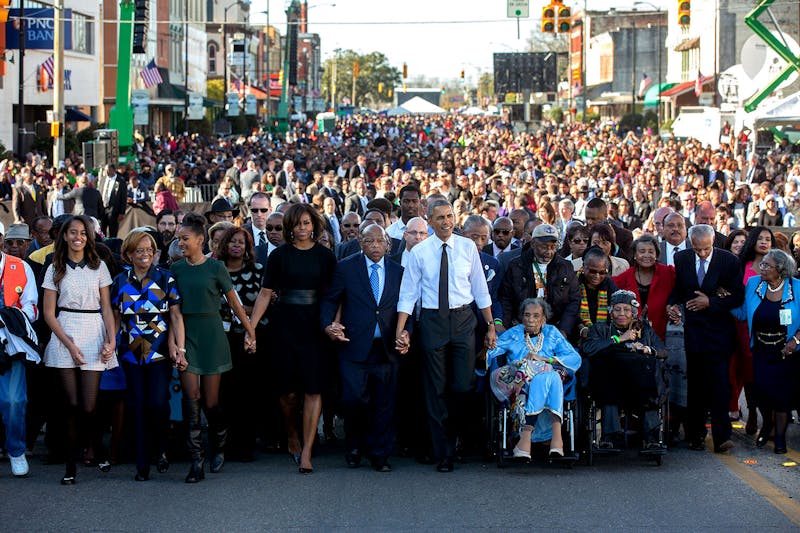
I know other people in the room will disagree with a lot of what you just said, Andrew. But in a way, you captured the core of Obama’s own take on race. He has been very clear and very conscious that his larger goal was essentially a civic one: to try and get people to see themselves in each other. Was that the right approach? Or did it limit what he could achieve, by appealing to our commonality rather than more forcefully confronting the policies and prejudices that divide us?
GORDON-REED: That’s always been the philosophy of people who have been arguing for black rights. That’s what we’ve been doing: We’re people. All men are created equal. We’ve used the Declaration of Independence, we’ve used all those kinds of things. I don’t know who this “left” is that Andrew’s talking about. Black people have always been trying to assert our equal humanity. That’s what we’ve led with. Obama’s approach is not that different than what other people are doing.
JAFFE: Keep in mind that the Tea Party came first. It wasn’t Black Lives Matter. The Tea Party was ready to be angry at Obama on day one, explicitly because he was a black president. It’s just chronologically backwards to say that thousands and thousands of Americans who finally got fed up with racial injustice and took part in protest movements were somehow responsible for polarizing the conversation or rejecting common ground.
PAINTER: We’ve been talking about what Obama might have done or what Obama didn’t do or what Obama should have done. But when we’re talking about a lot of American politics, it goes on at the state and local level. That’s where we need to focus as progressives. Maybe the Democratic Party didn’t do enough on that front. But American citizens have certainly shirked their responsibility to be involved in our public life.
I want to come back to what Obama said to Andrew—the idea that he became president 20 years too soon. With his election, Obama accelerated a demographic trend that we all expected would take much, much longer to manifest itself. Will he be judged differently as the world catches up to what he managed to accomplish?
GORDON-REED: As a historian, we’re never supposed to predict the future. But I think I would disagree with him. He came exactly at the time he was supposed to come.
PAINTER: Otherwise, he couldn’t have come at all.
GORDON-REED: He belongs where he was, and it’s for us to deal with that. The conditions were right for it, and the country was ready for it. But it’s going to be a struggle. It’s always been a struggle. From Reconstruction, and even before then. This is just a step in the process. Just because there’s a backlash doesn’t mean that he didn’t come at exactly the right time. I don’t think he accelerated things. This is just the course of American history.
PAINTER: This is how it happened.
GORDON-REED: I think he’s here to teach lessons. We have lessons from this that came at precisely the right moment.
JAFFE: Right. His comment assumes that there are historical inevitabilities, and that people and social forces don’t make things happen.
GORDON-REED: It’s all contingent. That’s what history is—contingencies.
SULLIVAN: But this is all a slow disintegration of an American identity, which is not racial.
JAFFE: Has there ever been an American identity that was not racial?
SULLIVAN: Yes. There can be understood to be something that transcends race, as a citizen with no race.
PAINTER: Maybe if you’re really rich.
SULLIVAN: The racially obsessed people on the right and the left can’t quite get past this. But that is what Obama really represented: both black and white. The challenge of navigating that through a sense of national identity, which is not racial—which is the only way we can survive as a single country—is something he tried to do, tried so hard. But he was caught in a pincer movement between the racial left and the racial right.
JUDIS: Two things. First, it’s not surprising that Obama got the nomination in 2008. At that point, the two biggest interest groups in the Democratic Party that hadn’t yet got to serve at the top were blacks and women. And those were the two most important post-Sixties groups.
Second, when I was writing about the election in early 2008, I decided to do a study of whether a black guy could win the presidency that year. I looked at all these psychological studies designed to measure implicit racism, and I concluded that it was very unlikely that Americans would elect a black person. The lesson I drew from that ten months later, when Obama won the presidency, was that race is overrated in terms of understanding why people do things. I don’t think it is all about race. That’s a factor in Trump’s popularity, for instance, but it’s only a factor. And a lot of the people who voted for Trump this year were people who voted in Ohio for Obama in 2008 and 2012.
Obama became president in spite of racism in America. He became president because that is only one factor in people’s minds and motivations, and they can put it aside if there are other reasons.
GORDON-REED: I agree with you. It’s just one factor. But it was also a factor for people who wanted to vote for a person who is black, not just those who opposed him.
JUDIS: Yes, exactly.
VI. The Big Picture
Let’s talk about a larger perspective on his legacy. It’s worth pausing for a moment to remember what a huge goal Obama had when he ran for the White House. He didn’t just want to be president—he wanted to change the way politics work. He wanted to change the way we see ourselves. He wanted to usher in a new and lasting era of liberalism or centrism, depending on how you define it. When we look back at him from a historical perspective, will we think he succeeded?
JAFFE: No. It won’t be entirely his fault, though. I don’t think that was possible, given that capitalism was basically imploding around his ears when he entered office. There was certainly no new era of civility or bipartisanship. As everybody has pointed out, nobody was gonna let him do that, no matter how hard he tried.
The political change we’re experiencing right now has more to do with the resurgence of a populist right around the world: in Europe, in Latin America. We’re seeing Trumpism in many forms, in many places. To go back to Yeats, the center cannot hold. I don’t know how you can credit or blame Obama for any of it. I think it’s global.
JUDIS: Obama ran a brilliant campaign in 2008, based on “hope and change.” But a lot of it was premised on the record of Bush and the Iraq War. In terms of a new politics, he pretty much inherited this unwieldy coalition of Wall Street, Silicon Valley, Hollywood, and minorities, but with a lot of the white middle that used to be the center of the Democratic Party missing. It’s proven to be a coalition that on the key issues of globalization and worker rights is simply not able to do the job. The rise of Trump, and of his kind of politics, partly reflects the failure of the kind of Democratic politics that Obama inherited from Bill Clinton. I don’t think it was anything new. What was new was the brilliance of Obama’s campaign.
PAINTER: I see something going on in my home state of New Jersey that may tell us something about where we’re going and how we look back. The man who currently is looking like our next governor, Phil Murphy, comes out of Wall Street. He is funding his own campaign, and he is running very much to the left. He’s even talking about reviving labor unions. And if state and local politics are being revived like that in other parts of the country, we may see a different political galaxy in 2018, which could change the way we look back at Obama.
Andrew, any thoughts on Obama’s big ambition, and whether he succeeded?
SULLIVAN: We’ll see. To some extent, what happens to Trump’s vision and whether it works or not may help us look back on him in a different way. The one huge thing that’s been a background to all of this has been the enormous shift in the global economy over the last 30 years since the end of the Cold War. The way the global economy has expanded so dramatically, the competition for the kind of good, white-working-class jobs that used to be the backbone of the American middle class is just gone, never to return. And automation and technology is going to make it even worse.
There’s really no solution to this. Obamacare was about providing a safety net for exactly the white working class that ended up voting for Trump. That’s all the government can do, really, because it can’t stop the deep structural shifts in the global economy. And because there is no solution, my concern is that people will increasingly seek out authoritarian leaders, as well as scapegoats to blame for all sorts of things that cannot really be stopped.
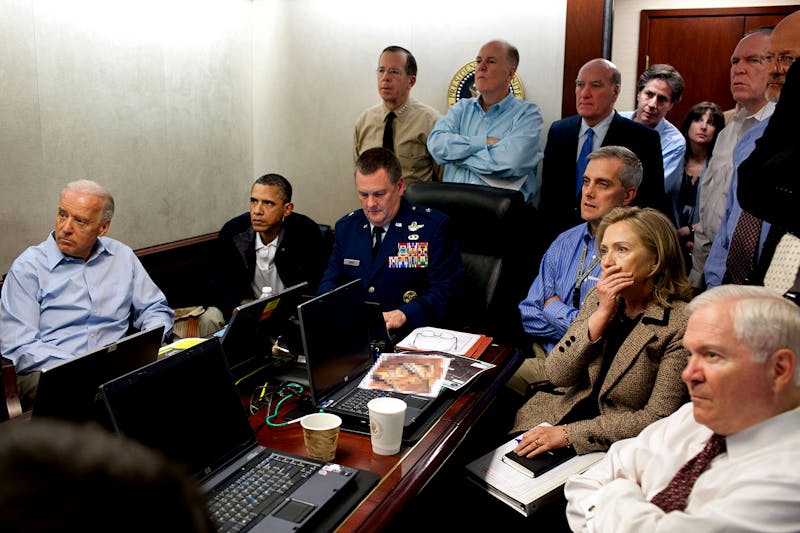
GORDON-REED: I agree. On your point about finding scapegoats—I mean, that’s American history. The South kept itself behind rather than accept help from the federal government: “I would rather not have a road if the Negro gets to ride on the road.” We’ve seen the same message played out over and over, from Bacon’s Rebellion in 1676: Don’t align yourself with those particular people. That’s something we have to conquer. But it’s a really tough nut to crack. Just reading about how technology is changing, things like self-driving cars and what that’s going to do to the workforce? It’s not going to be pretty.
SULLIVAN: That’s why we’ve got legal weed. [Laughter]
JAFFE: If you can afford it.
SULLIVAN: The whole country is going to be high. That’s the only option at this point. All the working-class men in particular who are under such siege right now will have to be high and playing video games to keep their lives together, because there’s much less work for them.
JAFFE: It’s not inevitable. None of it is inevitable. It’s all a question of who has power and who decides where it’s going to be distributed. If we decide that we are going to put millions of people out of work and not come up with something for them to do, then that’s ultimately a political question that is bigger than any one president.
PAINTER: And it’s bigger than the country as well.
GORDON-REED: And to go back to your original question, this is not something that Obama could have solved on his own.
SULLIVAN: Equally, Trump can’t solve it, either.
JAFFE: But that doesn’t mean there’s not a solution. There’s either going to be a lot of people starving in the streets or we’re going to find a way to take care of people. We may not like the solution, but there’s going to be one.
SULLIVAN: They won’t be starving.
JAFFE: There is starving already.
VII. The Verdict of History
All of you have studied Obama closely over the years, and several of you are historians. Which presidents will history compare him to?
GORDON-REED: I get this question every year. It’s too soon. He’s not even finished yet.
PAINTER: The great presidents faced extraordinary challenges. Are we going to put him up with Franklin Roosevelt? Well, he didn’t go to war and he didn’t get a depression. He’s certainly going to be above Reagan, if you ask me.
JAFFE: I would hope so.
GORDON-REED: I don’t know. In terms of influence? I can’t say that now. It’s too soon.
JUDIS: I completely endorse the prior responses. I don’t know.
PAINTER: I would put him right under Franklin Roosevelt, but I’m a partisan.
GORDON-REED: I’m a partisan, too, but I can’t.
JUDIS: There’s a political scientist from Yale who wrote a book about transformative presidents. I don’t think Obama was a transformative president, but Reagan was. So were Wilson and Roosevelt. I’m not saying that’s good or bad. Wilson changed the way people saw America’s role in the world, and Roosevelt changed the way Americans saw the relationship between government and economy. I don’t think Obama will be remembered in that tier of presidents.
GORDON-REED: That might be true. That’s why I hesitated to, say, put him in the category of Reagan. But Barack, Michelle, and their children—the idea of a black family in the White House—will be transformative to young people who grew up with them and who have followed them. It may have changed the attitude about race for younger people.
SULLIVAN: I second everybody—it is way too soon. It all depends on what happens in the next few years. One has the feeling, though, that future generations will potentially look back and see a president as influential as Reagan. He ran a principled, ethical, largely scandal-free administration. He may have permanently reoriented the United States away from its post–Second World War, post–Cold War interventionist position. He moved us decisively toward universal health care. He established civil rights for gay people, and he grappled with climate change, the issue which will hang over all of us.
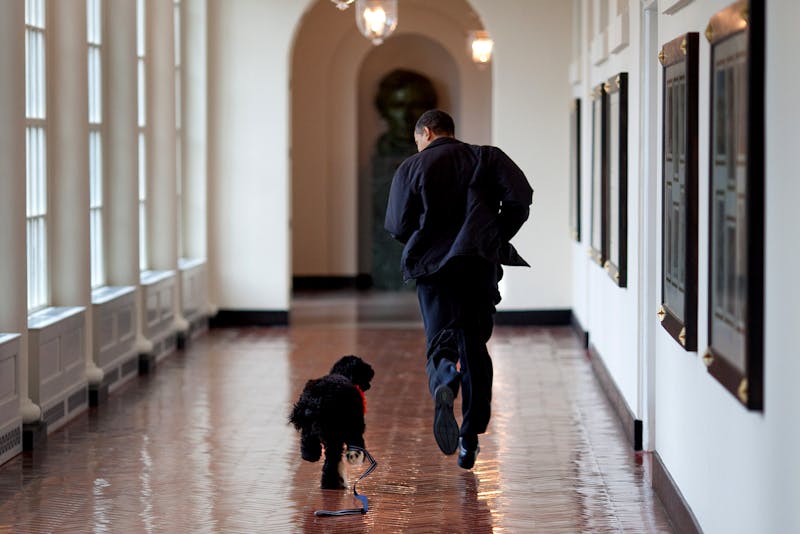
People will see the sheer caliber of this man. The grace and poise with which he conducted himself in unbelievably difficult circumstances; the way he withstood abuse and disrespect with extraordinary calm and goodwill. He will in his post-presidency become a symbol, maybe somebody we need more than when he was president, to remind us of what it is to be dignified in public life. Especially if this hideous monster who’s succeeding him continues to despoil the public culture.
We have to remember, Obama is leaving office having been elected twice by a majority and with approval ratings that are matching Reagan’s. If he had a successor who could continue that, then he would be in the epic position to be the architect of the entire twenty-first century.
It may be, in my view, that the counterreaction is so perverse and so destructive that we will return to this figure as the cornerstone of our future. And he is young. At some point in the future, with the possible bloodshed and civil unrest in this country that we’re about to engage in, he may be a key person as a post-president—a bit like a monarch who might be able to hold us all together.
PAINTER: [Applauding] Well said, Andrew, well said!
GORDON-REED: That’s exactly right. We have the advantage of having him around as a young man—and his wife and family, too, who have been incredibly important to the spirits of so many people.
JAFFE: I’m very interested to see what Obama does under President Trump.
That was actually my final question for you all. If Obama came to you and said, “What should I do in my post-presidency?” what would you tell him?
SULLIVAN: No speeches at Goldman Sachs, please. [Laughter]
GORDON-REED: He says he wants to do something about gerrymandering.
JAFFE: That would be really, really, really important. Push to restore the Voting Rights Act. Fight voter suppression. Go get some Democrats elected governor.
PAINTER: Should he become the head of the Carnegie Foundation or something like that? Or a new nonprofit in his name?
GORDON-REED: It would probably be easier if he could do it on his own.
PAINTER: Well, he has a lot of really rich friends.
GORDON-REED: He should come back to Harvard Law School for the two-hundredth anniversary and talk.
SULLIVAN: He should also be completely silent. He should take a Bush position for a couple of years. It would be much smarter for him to withdraw and say, “Let this fool do what he does,” without intervening in any way. Because at some point, they’ll be saying, “Where have you gone, Barack Obama? A nation turns its lonely eyes to you.”
We’re going to need him. Let him stay above the fray, outside the world for a while, to recoup and to sleep and to write probably the best presidential memoir ever. To do what Churchill did after the Second World War and to write the literary account of this period. He deserves that. I have no idea how he got through this.
PAINTER: Absolutely.
SULLIVAN: My heart has gone out to him so many times. I get emotional just thinking about what they did to this man. What a beautiful American. [Begins to choke up] You know, I’m going to be sworn in as an American soon.. . .
PAINTER: Oh, cool. Welcome!
SULLIVAN: Because Obama helped get rid of the HIV ban on people becoming Americans, which was signed by the Clintons. He means what America means, what it can mean—the dignity, the fusion of the races. He has a great temperament and great pragmatism, and he has great Midwestern decency. I’m in awe of this man. God bless him. I mean it. Thank you, Mr. President.
JAFFE: Congratulations.
